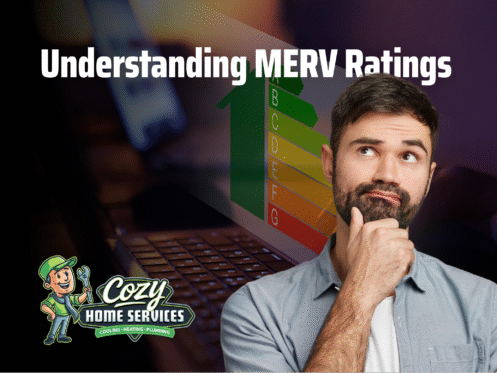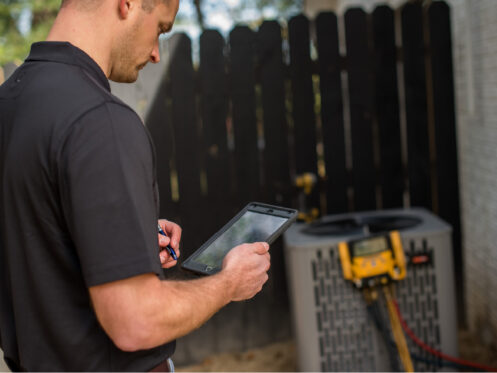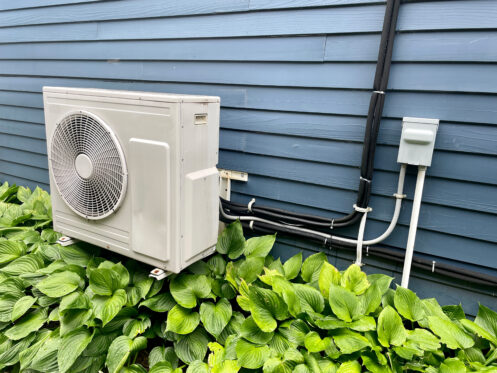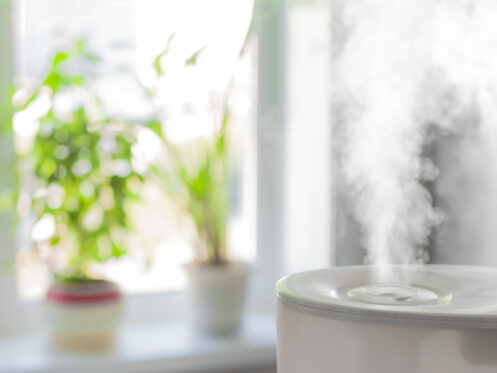Your HVAC air filter protects your home from excess dust, pollen, dander, and other airborne pollutants, but filters vary in their effectiveness according to MERV ratings. Understanding what the MERV rating on air filters means and how they work helps you select the right filter to balance indoor air quality with HVAC performance.
What Are MERV Ratings?
The Minimum Efficiency Reporting Value (MERV) ratings measure the effectiveness of an air filter in capturing airborne particles between 0.3 and 10 microns. The MERV rating scale ranges from 1 to 20. Lower ratings indicate minimum particle size efficiency, while higher ratings indicate the maximum efficiency possible, 99.7%. These ratings reflect a filterability at a minimum performance point, not just when they’re brand new.
How Do MERV Ratings Work?
The MERV rating scale evaluates a filter’s ability to trap particles within a certain range, which includes common indoor pollutants such as dust, mold spores, pollen, and bacteria.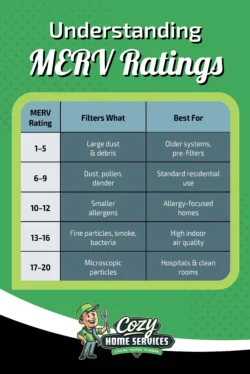
- MERV 1–5: Captures larger, coarse particles. Often used as prefilters or in older equipment.
- MERV 6–9: Captures common household dust, larger pollen, and many dander particles.
- MERV 10–12: Strong residential performance with higher capture across E2 and some E1 particles. Suitable for homes focused on allergy relief.
- MERV 13–16: High-efficiency options that address fine aerosols, many bacteria, and smoke particles. MERV 13 captures a minimum of 50% of particles ranging from 0.3 to 1.0 microns in diameter that pass through the filter during system operation.
- MERV 17–20: Specialized filters for hospitals or clean rooms.
Why Are MERV Ratings Important?
MERV ratings directly affect air quality, HVAC performance, and energy costs. Choosing the right filter helps maintain both household health and system reliability.
Indoor air quality
A higher-rated filter reduces airborne allergens, dust, and pollutants in your home, improving indoor air quality. For people with asthma or allergies, a higher MERV rating can significantly reduce symptoms. Cleaner air supports better sleep, eliminates lingering odors, and creates a healthier environment.
HVAC wear and longevity
Filters also protect the system itself. Without adequate filtration, dirt and debris coat coils, fans, and ductwork. This buildup reduces efficiency, increases wear on parts, and raises the likelihood of breakdowns. Using a filter with the appropriate MERV rating helps keep your HVAC equipment clean and extends its lifespan.
Energy efficiency and costs
A compatible filter supports the airflow throughout the HVAC system, allowing the blower to work efficiently and reduce strain during each cycle. A dense filter may catch more particles, but it can also restrict airflow in a mismatched HVAC system and increase energy use. If the filter doesn’t remove enough particles, dust and debris can clog the system and likewise reduce efficiency. A clean filter with the correct MERV rating enables your system to operate at optimal efficiency.
Choosing the Right MERV Rating
The right filter depends on your household, the type of HVAC equipment you have, and your maintenance preferences. Consider your air quality goals first, then match them to what your system can comfortably handle.
Household needs
Many households have filters rated 6 to 8, but families with allergy sufferers, pets, or local pollutant factors often benefit from higher-rated filters that capture finer particles. Homes in wildfire-prone areas or near highways and heavy traffic may benefit from filters rated 13 or higher to deal with smoke and smog.
HVAC system compatibility
Not every system can handle high MERV ratings. Residential systems, for example, are generally not compatible with MERV filters designed for hospitals or sterile environments. Older units may not have enough power to push air through dense filter material, resulting in weak airflow, frozen coils, long cycles, or blower motor strain. A professional inspection can determine which ratings your system supports without compromising performance.
Cost and maintenance
Higher-rated filters may cost more per piece and require more frequent replacement depending on indoor air quality levels. Even so, a thicker pleated filter with a larger surface area often lasts longer and maintains airflow more effectively than a standard air filter. Balancing your budget with performance helps you maintain air quality without overspending.
Common Misconceptions About MERV Ratings
Several common misunderstandings about MERV filters often lead homeowners to select filters that don’t match their needs or system requirements. Knowing the most common misconceptions can help you make a smarter choice:
- Higher is always better: Very high ratings can restrict airflow and reduce system performance.
- MERV and HEPA are interchangeable: HEPA filters are separate from MERV ratings. They may require specialized HVAC equipment or upgrades.
- Filters don’t affect energy use: Dense filters force the blower to work harder, raising utility costs. Finding the right balance of filtration and density is best for overall efficiency.
- One size fits all: Every household has different needs based on health factors, location, and HVAC design. Filters must be matched to those factors rather than chosen by rating alone.
Contact the HVAC Professional at Cozy Home Services
Choosing the right filter and MERV rating is easier with expert guidance. Cozy Home Services offers comprehensive, expert HVAC services that focus on what’s needed and the most efficient way to get the job done. True to our core values, our HVAC company is upfront about pricing, and our rates are budget-friendly. We work hard to earn our customers’ trust and satisfaction, ensuring your home stays comfortable year-round! Contact us today to schedule a service.
Frequently Asked Questions
Do filters with the same MERV rating always perform equally?
While MERV provides a baseline comparison, factors such as filter material, thickness, and quality affect longevity and airflow resistance. Two filters with the same rating may capture similar particle sizes but differ in durability and replacement intervals.
How often should I change my air filter?
Air filters require replacement every 30 to 90 days, depending on usage and your indoor environment. Check your air filter monthly, especially during periods of peak heating or cooling, and replace it if it appears clogged.
Do MERV filters reduce odors?
A MERV filter doesn’t directly absorb odors from the air, but it can catch particles that cause the odors. Homeowners can also consider installing carbon filters in their homes to reduce odors.
